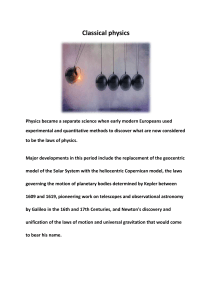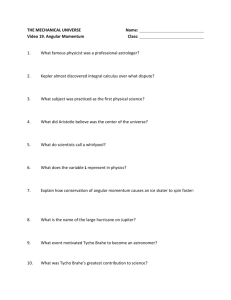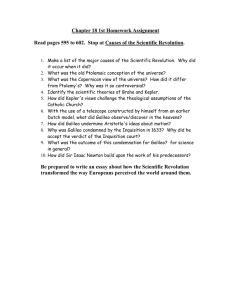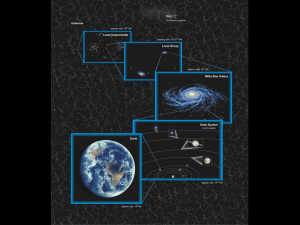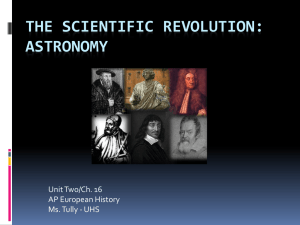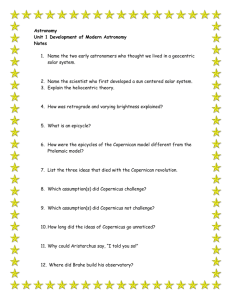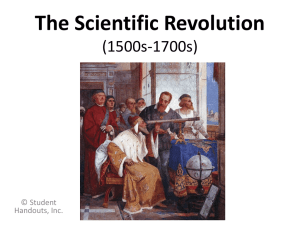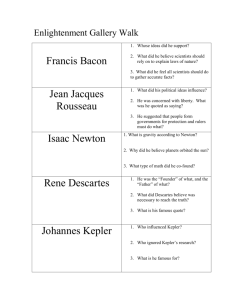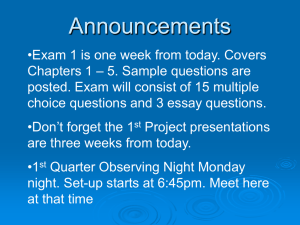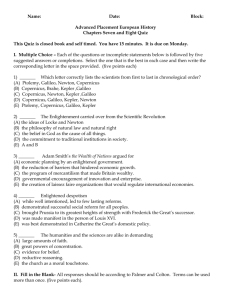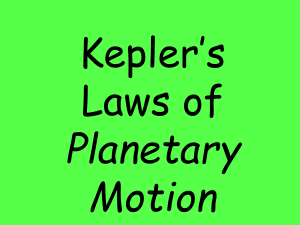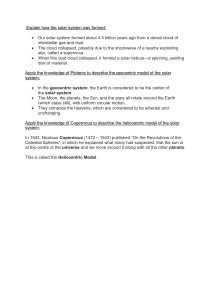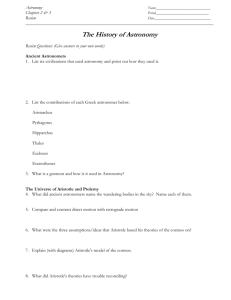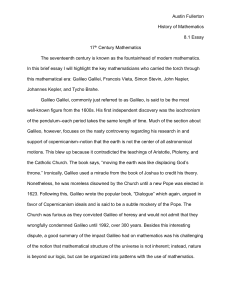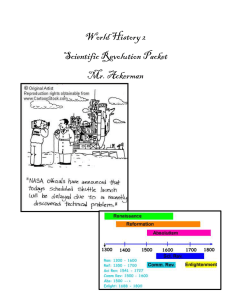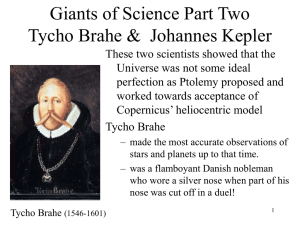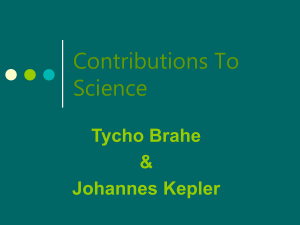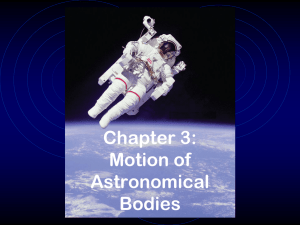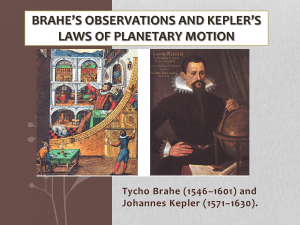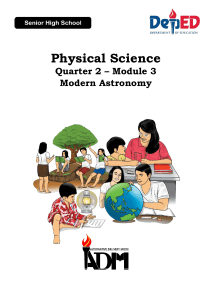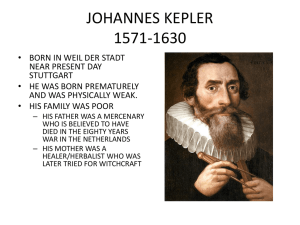Chapter 18 Review Quiz Rationale
advertisement
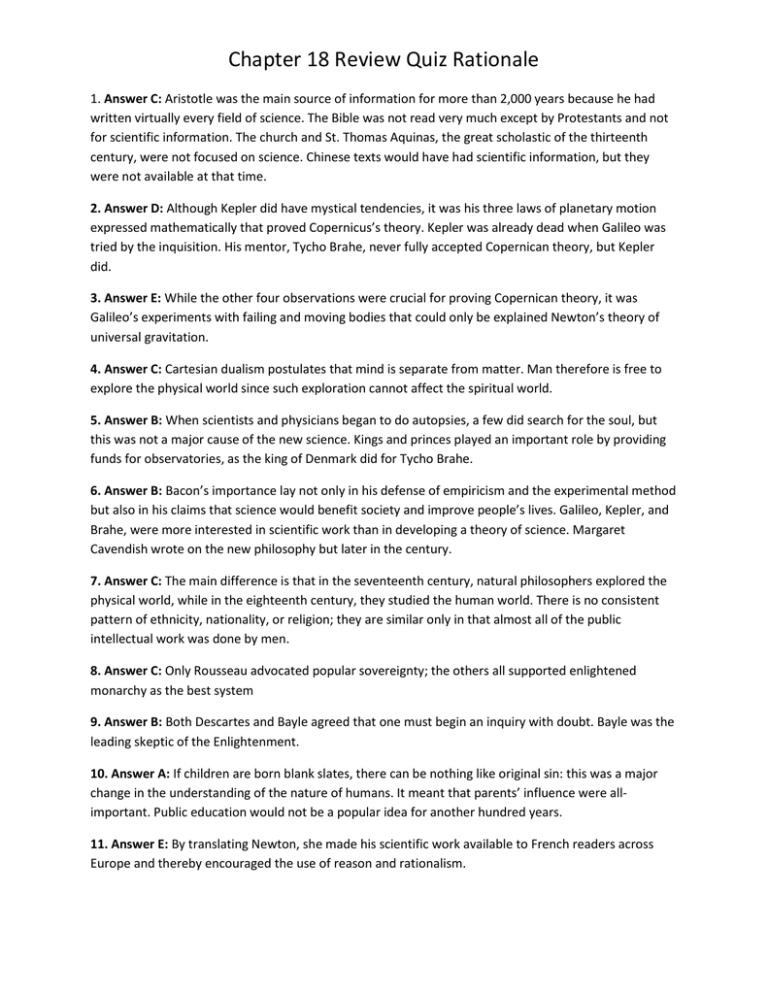
Chapter 18 Review Quiz Rationale 1. Answer C: Aristotle was the main source of information for more than 2,000 years because he had written virtually every field of science. The Bible was not read very much except by Protestants and not for scientific information. The church and St. Thomas Aquinas, the great scholastic of the thirteenth century, were not focused on science. Chinese texts would have had scientific information, but they were not available at that time. 2. Answer D: Although Kepler did have mystical tendencies, it was his three laws of planetary motion expressed mathematically that proved Copernicus’s theory. Kepler was already dead when Galileo was tried by the inquisition. His mentor, Tycho Brahe, never fully accepted Copernican theory, but Kepler did. 3. Answer E: While the other four observations were crucial for proving Copernican theory, it was Galileo’s experiments with failing and moving bodies that could only be explained Newton’s theory of universal gravitation. 4. Answer C: Cartesian dualism postulates that mind is separate from matter. Man therefore is free to explore the physical world since such exploration cannot affect the spiritual world. 5. Answer B: When scientists and physicians began to do autopsies, a few did search for the soul, but this was not a major cause of the new science. Kings and princes played an important role by providing funds for observatories, as the king of Denmark did for Tycho Brahe. 6. Answer B: Bacon’s importance lay not only in his defense of empiricism and the experimental method but also in his claims that science would benefit society and improve people’s lives. Galileo, Kepler, and Brahe, were more interested in scientific work than in developing a theory of science. Margaret Cavendish wrote on the new philosophy but later in the century. 7. Answer C: The main difference is that in the seventeenth century, natural philosophers explored the physical world, while in the eighteenth century, they studied the human world. There is no consistent pattern of ethnicity, nationality, or religion; they are similar only in that almost all of the public intellectual work was done by men. 8. Answer C: Only Rousseau advocated popular sovereignty; the others all supported enlightened monarchy as the best system 9. Answer B: Both Descartes and Bayle agreed that one must begin an inquiry with doubt. Bayle was the leading skeptic of the Enlightenment. 10. Answer A: If children are born blank slates, there can be nothing like original sin: this was a major change in the understanding of the nature of humans. It meant that parents’ influence were allimportant. Public education would not be a popular idea for another hundred years. 11. Answer E: By translating Newton, she made his scientific work available to French readers across Europe and thereby encouraged the use of reason and rationalism. Chapter 18 Review Quiz Rationale 12. Answer D: All the enlightened monarchs promoted legal reforms, although to varying degrees. Only Joseph II abolished serfdom and instituted religious tolerance for Jews. 13. Answer C: When the peasants rose in rebellion under Pugachev, Catherine abandoned her reform efforts. The nobles’ position was strengthened, not weakened, under Catherine. Voltaire never humiliated her in print. Catherine died a natural death. 14. Answer B: Diderot’s efforts were underwritten by Catherine the Great, not Frederick. The Dictionary was a hugely popular work, published mostly abroad because of censorship. It was filled with technical knowledge and helped democratize knowledge, which was its aim. 15. Answer C: A greatly enlarged literate population began to read silently and privately, in contrast to the typical reading aloud by the head of the household in the evenings to his family and guests.
